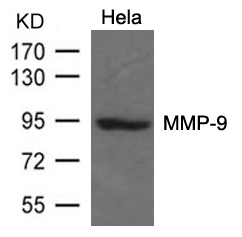
| WB | 咨询技术 | Human,Mouse,Rat |
| IF | 咨询技术 | Human,Mouse,Rat |
| IHC | 咨询技术 | Human,Mouse,Rat |
| ICC | 技术咨询 | Human,Mouse,Rat |
| FCM | 咨询技术 | Human,Mouse,Rat |
| Elisa | 咨询技术 | Human,Mouse,Rat |
| Aliases | GELB, CLG4B, MMP-9, MANDP2, |
| Entrez GeneID | 4318; |
| WB Predicted band size | 84 92kDa |
| Host/Isotype | Rabbit IgG |
| Antibody Type | Primary antibody |
| Storage | Store at 4°C short term. Aliquot and store at -20°C long term. Avoid freeze/thaw cycles. |
| Species Reactivity | Human |
| Immunogen | Peptide sequence around aa.110-114(F-E-G-D-L) derived from Human MMP-9. |
+ +
1. **"Matrix metalloproteinase-9 (MMP-9) as a novel biomarker for disease monitoring in multiple sclerosis"**
*Authors: Lee, J. et al.*
摘要:该研究验证了MMP-9抗体在检测多发性硬化症患者血清中MMP-9水平的应用,发现其浓度与疾病活动性呈正相关,提示其作为治疗监测标志物的潜力。
2. **"Targeting MMP-9 with a monoclonal antibody inhibits glioma invasion in preclinical models"**
*Authors: Zhang, H. et al.*
摘要:通过开发高特异性MMP-9单克隆抗体,研究证明其在抑制胶质瘤细胞侵袭和血管生成中的作用,为抗肿瘤治疗提供新策略。
3. **"Neutralizing MMP-9 antibody attenuates colitis-associated fibrosis in mice"**
*Authors: Wang, Y. et al.*
摘要:利用MMP-9中和抗体干预小鼠结肠炎模型,显著降低肠道纤维化标志物水平,表明靶向MMP-9可能成为炎症性肠病的治疗途径。
4. **"Development of a high-affinity anti-MMP-9 antibody for molecular imaging of atherosclerotic plaques"**
*Authors: Smith, R. et al.*
摘要:研究团队设计了一种靶向MMP-9的抗体探针,通过体内成像技术成功定位动脉粥样硬化斑块,证明其在心血管疾病无创诊断中的价值。
Matrix metalloproteinase-9 (MMP-9), also known as gelatinase B, is a zinc-dependent endopeptidase belonging to the MMP family. It plays a critical role in degrading extracellular matrix (ECM) components, particularly type IV collagen, facilitating tissue remodeling, wound healing, and angiogenesis. However, dysregulated MMP-9 activity is implicated in pathological processes, including cancer metastasis, inflammatory diseases (e.g., arthritis, atherosclerosis), and neurological disorders (e.g., stroke, Alzheimer’s disease).
MMP-9 antibodies are essential tools for detecting and quantifying MMP-9 expression in research and diagnostics. They enable the identification of MMP-9 in tissues or fluids via techniques like Western blotting, immunohistochemistry, and ELISA. These antibodies often target specific epitopes, such as the catalytic domain or propeptide region, to distinguish active MMP-9 from its inactive precursor (pro-MMP-9) or other MMPs.
In therapeutic contexts, MMP-9 inhibitors, including monoclonal antibodies, have been explored to block its ECM-degrading activity, aiming to curb tumor invasion or inflammation. However, clinical success remains limited due to off-target effects and MMP family redundancy. Research continues to refine antibody specificity and develop biomarker applications, as elevated MMP-9 levels correlate with disease progression in cancers and chronic inflammatory conditions.
Overall, MMP-9 antibodies serve as vital reagents for understanding its biological roles and developing targeted therapies, despite challenges in clinical translation.
×